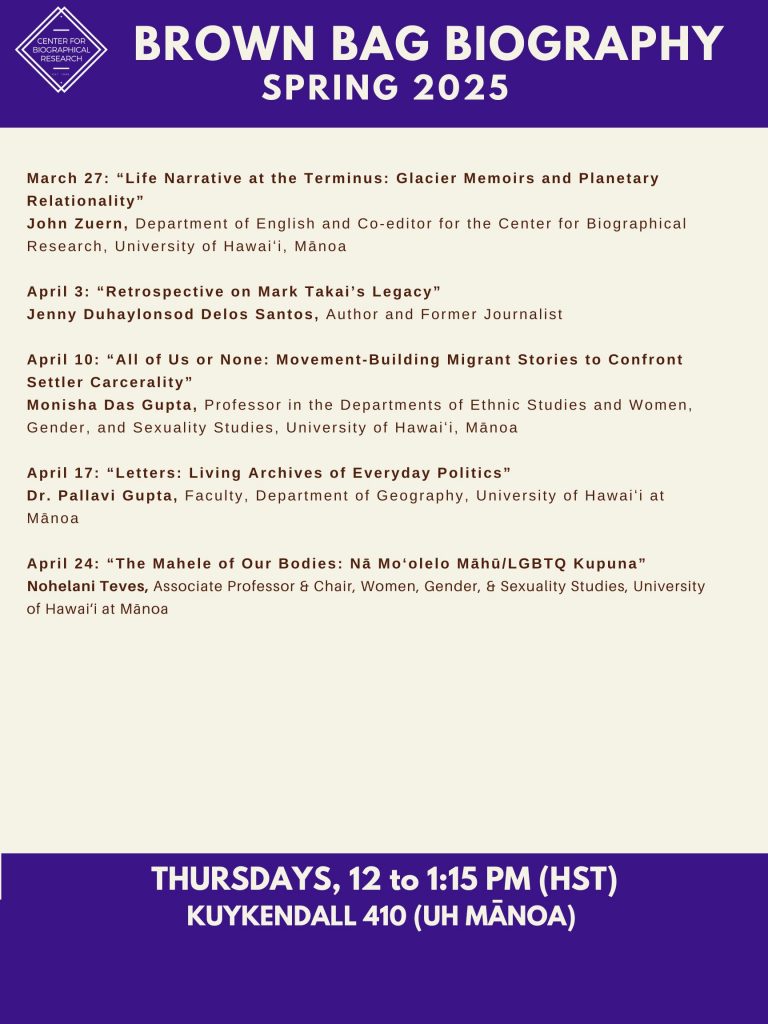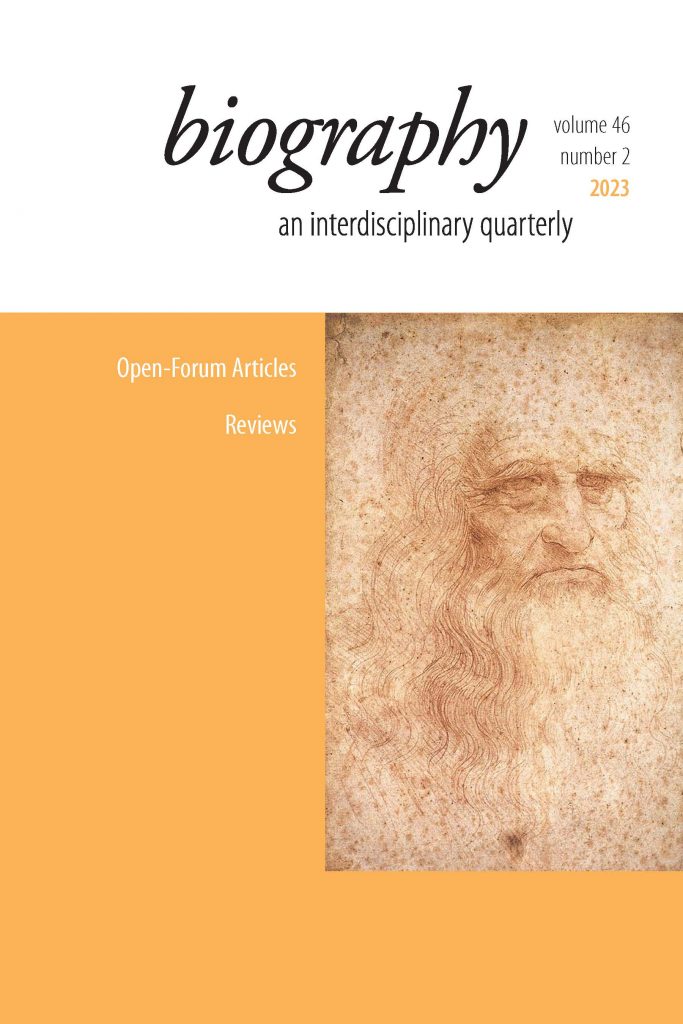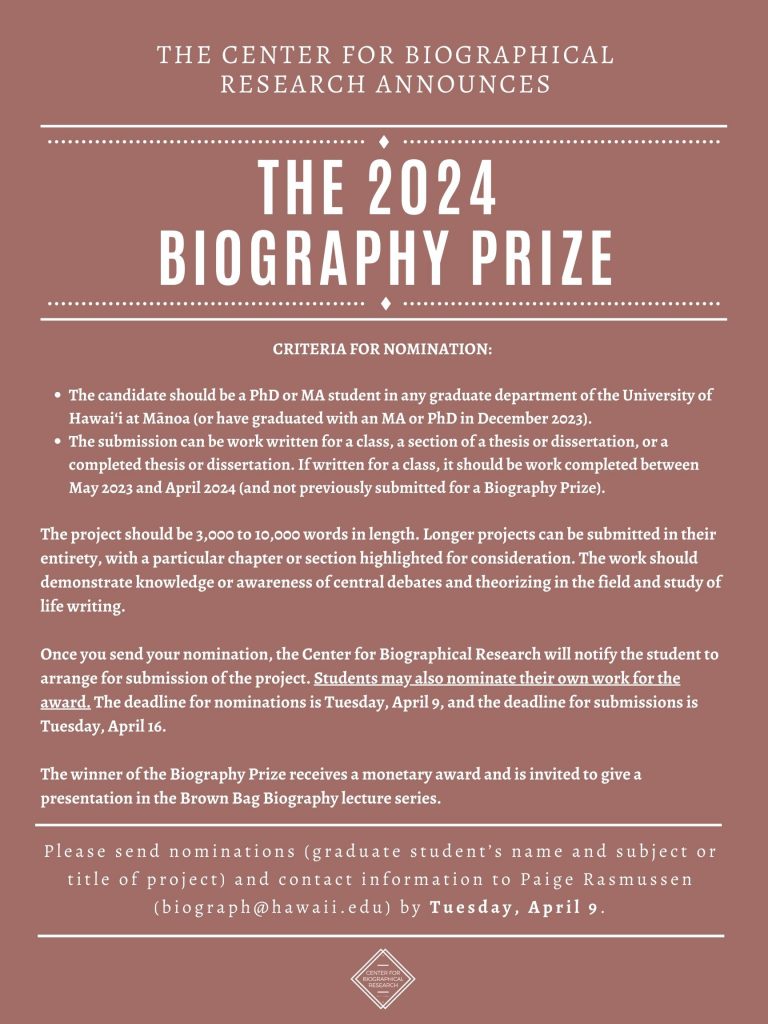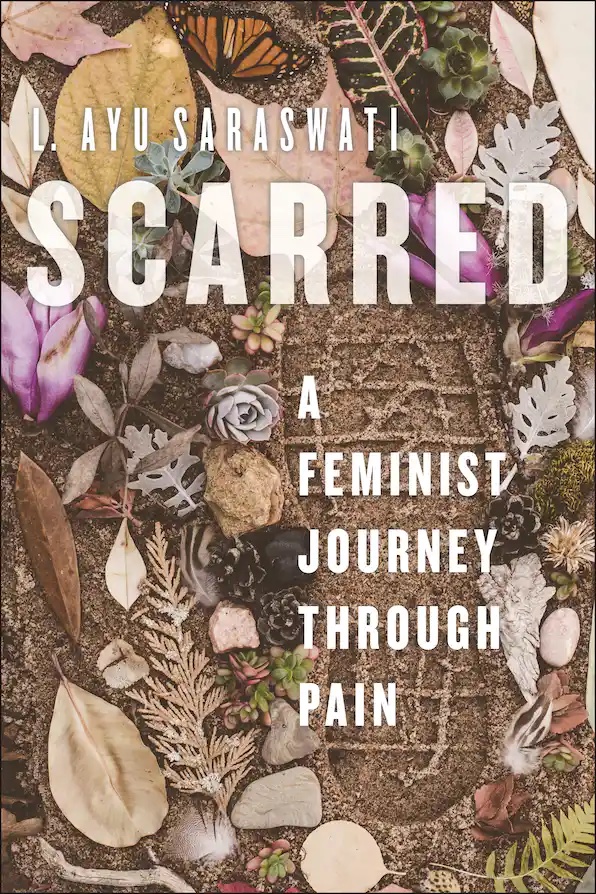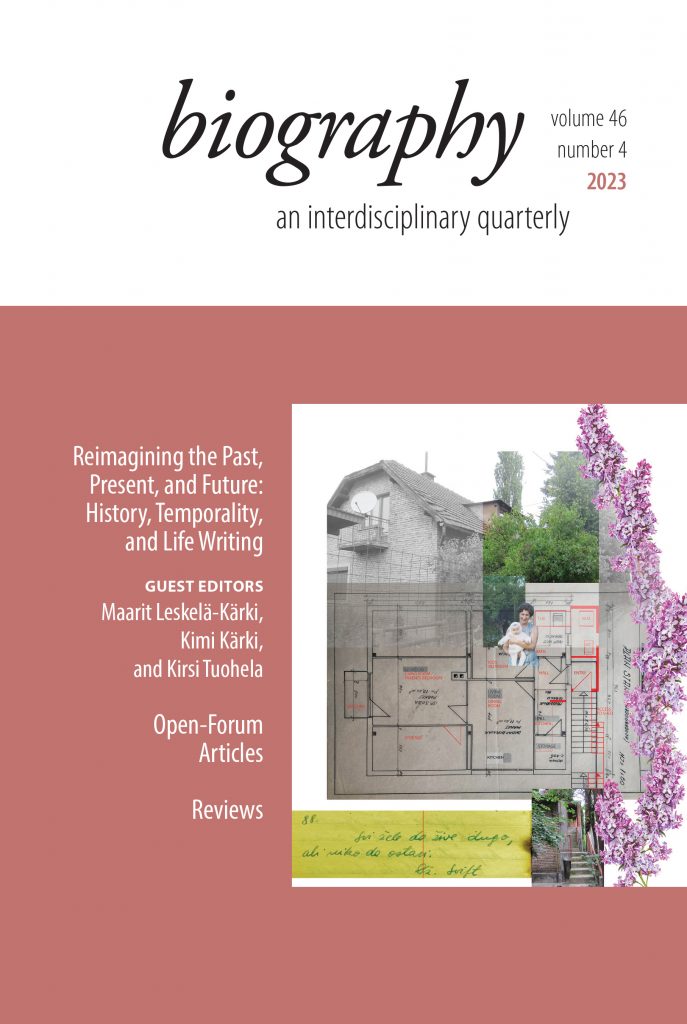
We are pleased to announce the publication of Biography 46.4. Find it on Project Muse: https://muse.jhu.edu/issue/54730.
Biography: An Interdisciplinary Quarterly
vol. 46, no. 4, 2023
Table of Contents
Editor’s Note
Reimagining the Past, Present, and Future: History, Temporality, and Life Writing
Reimagining the Past, Present, and Future: History, Temporality, and Life Writing
Maarit Leskelä-Kärki, Kimi Kärki, and Kirsi Tuohela
This cluster, comprising an introduction and six essays, seeks to integrate the disciplines of life writing and history, building on discussions from the 2022 IABA World Conference, “Life-Writing: Imagining the Past, Present, and Future.” Temporality has emerged as a critical dimension for analyzing narratives of lives, and serves as a central theme of this cluster, explored through diverse methodologies, including historians’ attentiveness to the past and archival practices, as well as literary, narrative, and other critical analyses. The cluster aims to illuminate the multifaceted and intellectually intricate nature of temporality, addressing perspectives that range from the global to personal and familial histories, from narratives of climate change to those of trauma. It also emphasizes the role of imagination and creativity in shaping and reinterpreting our understanding of the past.
Stories of a Life: Backward, Forward, or Sideward?
Jens Brockmeier
The wider theoretical and empirical context of this study is the temporal multilayeredness of our narrative constructions of life and identity, both in fictional and nonfictional genres of life writing. Using examples and illustrations from autobiographical memory, fiction, photography, and everyday phenomenology, this essay argues that narrative—in Western traditions of identity formation—plays a crucial role in juggling the many balls of time and identity.
Biofiction’s Melancholic Agency: Deep Time and the Return of History in the Works of Amin Maalouf and Colum McCann
Laura Cernat
Aiming to nuance Paul Ricoeur’s theories about temporality and identity in fiction and historiography, this article explores biofiction through the prism of Fernand Braudel and Wai Chee Dimock’s notion of deep time. Building on case studies by Amin Maalouf and Colum McCann, I coin the notions of “deep-historical biofiction” and “biofictional histoire croisée” to draw attention to these contemporary writers’ awareness of history’s impact on individual destinies in a world of interdependent developments, which resists human agency while also inviting it to persist. Here I introduce the idea of melancholic agency. Inspired by Ian Baucom’s concept of “melancholy realism” from Specters of the Atlantic and its application by Debjani Ganguly to the contemporary world novel, melancholic agency in biofiction entails preserving the emphasis placed by Michael Lackey on human agency as a distinctive attribute of the genre, while acknowledging that, especially in novels concerned with deep time, this agency often resides only in the power to bear witness, or to imaginatively restore lost truths. This suggests that the gap between the biographical and the historical novel is narrower than previously theorized in biofiction scholarship.
Embedded and Retrieved: A Full Circle of Life, Birth, and Death within Forty-Two Square Meters
Selma Ćatović Hughes
This work aims to engage visual storytelling to reveal the tangible and elusive layers of personal and collective memory. A forty-two-square-meter apartment in Sarajevo purchased by a newlywed couple in 1972 would go on to witness the birth of two children, the early loss of two parents, and life under the siege. A series of original drawings, overlaid with information retrieved from the past (photos, artifacts, and letters), begins to reveal recollections embedded in the space across four decades: the chants of a grandmother’s blessings for the empty new space; the happiness and liveliness of children filling the home with life; the sudden loss of a parent and the basic struggle for survival during the war; the reconstruction of lives in post-conflict society; and finally, another loss of life, and with that, the loss of home. Simultaneously recalling the past and projecting the transformation of the future sequence of events, “Embedded and Retrieved” weaves immaterial connections between life episodes, their impact on spatial modification, and the metamorphosis of the place forever called home.
Picturing a Cubist View of Time (and Space) in Autobiographical Comics
Nancy Pedri
This essay addresses how space and time in autobiographical comics are productively understood in relation to characters and their minds. Distancing itself from approaches that see the relation between time and space as a feature of the formal language of comics, it examines time and space across verbal-visual narrative strategies that deconstruct the bodies of characters or dissolve the spaces they occupy. Through several examples of what can be called, following comics creator Michael DeForge, a cubist view of time, “Picturing a Cubist View of Time (and Space) in Autobiographical Comics” traces how autobiographical comics create temporal and spatial overlaps and indistinctions that can communicate troubled or wounded mental states.
Here for 450 Million Years, Going Now: Ocean Timelines, Climate Crisis, and Life Writing
Clare Brant
This article lays out a case for lifewriting scholars to think about numbers as an important constituent of climate crisis writing. Numbers are critical to how we describe time, plummeting numbers of species, and accelerating rates of extinction. Numbers are also critical to how we establish scales. I discuss infographics as a lifewriting genre that combines biography and numbers, a genre that lends temporary stability to otherwise unimaginable scenarios. Various iterations of numbers in timekeeping devices such as clocks and time bombs provide ways of imaging time and contribute to the power of numerical narratives to tell life stories. So too does biologging, a biographical genre. Studies of future oceans modelled through currently nearly dead, time capsule seas project futures through numbers. The life history and short future of sharks frames my analysis of the power of numbers in life writing.
A Short History of Being Wrong
Sirpa Kähkönen
Sirpa Kähkönen discusses political polarization and political violence during the Finnish Civil War in 1918 and again in 1930. She contextualizes the topic to her own family history, and tells about her explorations with her grandfather’s private archives, as well as her extensive work in the official police and prison archives, and how she came to write both fiction and nonfiction based on this archival work. The microhistorical concept of immaterial inheritance has been the main source of inspiration for Kähkönen, and she has also been deeply involved in questions of psychohistory, epigenetics, and the transgenerational effects of wars and other humanitarian crises.
Open-Forum Articles
Expertise and the Technological Object: Narrating Lived Experience of Deafness, Hearing Aids, and Cochlear Implants in Online Forums
Jessica Kirkness and Nicole Matthews
This article discusses the relationship between technological objects—specifically hearing devices such as hearing aids and cochlear implants—and the stories told about them on hearing-related blogs and online forums. We focus on accounts of lived experience written by deaf and hard of hearing people, and the ways they navigate competing narratives around expertise in relation to these objects. We discuss how these online “flash autobiographies” draw from available scripts around deafness, simultaneously challenging the hierarchy of expertise in hearing health and highlighting the binary between medical and social model accounts of disability. We focus on the ways that self-formation is mediated in these stories, with many testimonies emphasizing mastery through medico-technical discourses and numerical subjectivities. Drawing on the narratives in these public forums, we sketch the diverse relationships between expertise and the intimate object of the hearing device.
The Centenary of the “Polish Method”: The Rise, Fall, and Revival of Memoir Competitions in Poland
Agata Zysiak
The first memoir competition in Poland took place one hundred years ago. This landmark method of Polish sociology began in the interwar period, experienced a later state-socialist boom, and then Poland’s impressive collection of memoirs was largely forgotten and almost destroyed in the 1990s. In this essay, I examine the development of memoir competitions in Poland and discussions around them as a method, giving particular attention to the political agenda of memoir studies during the People’s Republic of Poland. In the context of recognizing working-class and peasant people as social actors and political subjects, I defend postwar memoir competitions as a reliable and valuable means of arguing against the idea that memoirs were merely political tools to legitimize the socialist state. Ultimately, the memoir competitions play a crucial role in revisionist interpretations of the postwar history of Poland, state socialism, and to a certain degree, the entire socialist world.
Review Essay
Questions of Degree: Autofiction on Spectrums from Individual to Collective and from Fiction to Reality
Alexandra Effe
This review essay shows how Hywel Dix’s Autofiction and Cultural Memory (Routledge, 2023) and Fiona J. Doloughan’s Radical Realism, Autofictional Narratives and the Reinvention of the Novel (Anthem Press, 2023) partake in three recent developments in autofiction studies: the exploration of the global reach of autofictional practice, the foregrounding of autofiction’s often ethical orientation, and the need to consider production and reception in approaching a phenomenon difficult to pin down to textual elements alone. Taking inspiration from Dix’s and Doloughan’s studies, the essay develops a theoretical argument for considering autofictional texts as always straddling a spectrum of individual and collective elements, and as always being grounded in reality as well as being fictionally transformed.
Reviews
Nonhuman Witnessing: War, Data, and Ecology After the End of the World, by Michael Richardson
Reviewed by Gillian Whitlock
The Divided States: Unraveling National Identities in the Twenty-First Century, edited by Laura J. Beard and Ricia Anne Chansky
Reviewed by Sergio da Silva Barcellos
Living in Words: Literature, Autobiographical Language, and the Composition of Selfhood, by Garry L. Hagberg
Reviewed by Sarah Allen
Story Revolutions: Collective Narratives from the Enlightenment to the Digital Age, by Helga Lenart-Cheng
Reviewed by Laurie McNeill
A History of African American Autobiography, edited by Joycelyn K. Moody
Reviewed by Nadine M. Knight
The Disabled Child: Memoirs of a Normal Future, by Amanda Apgar
Reviewed by G. Thomas Couser
I Lived to Tell the World: Stories from Survivors of Holocaust, Genocide, and the Atrocities of War, by Elizabeth Mehren
Reviewed by Roger Porter






